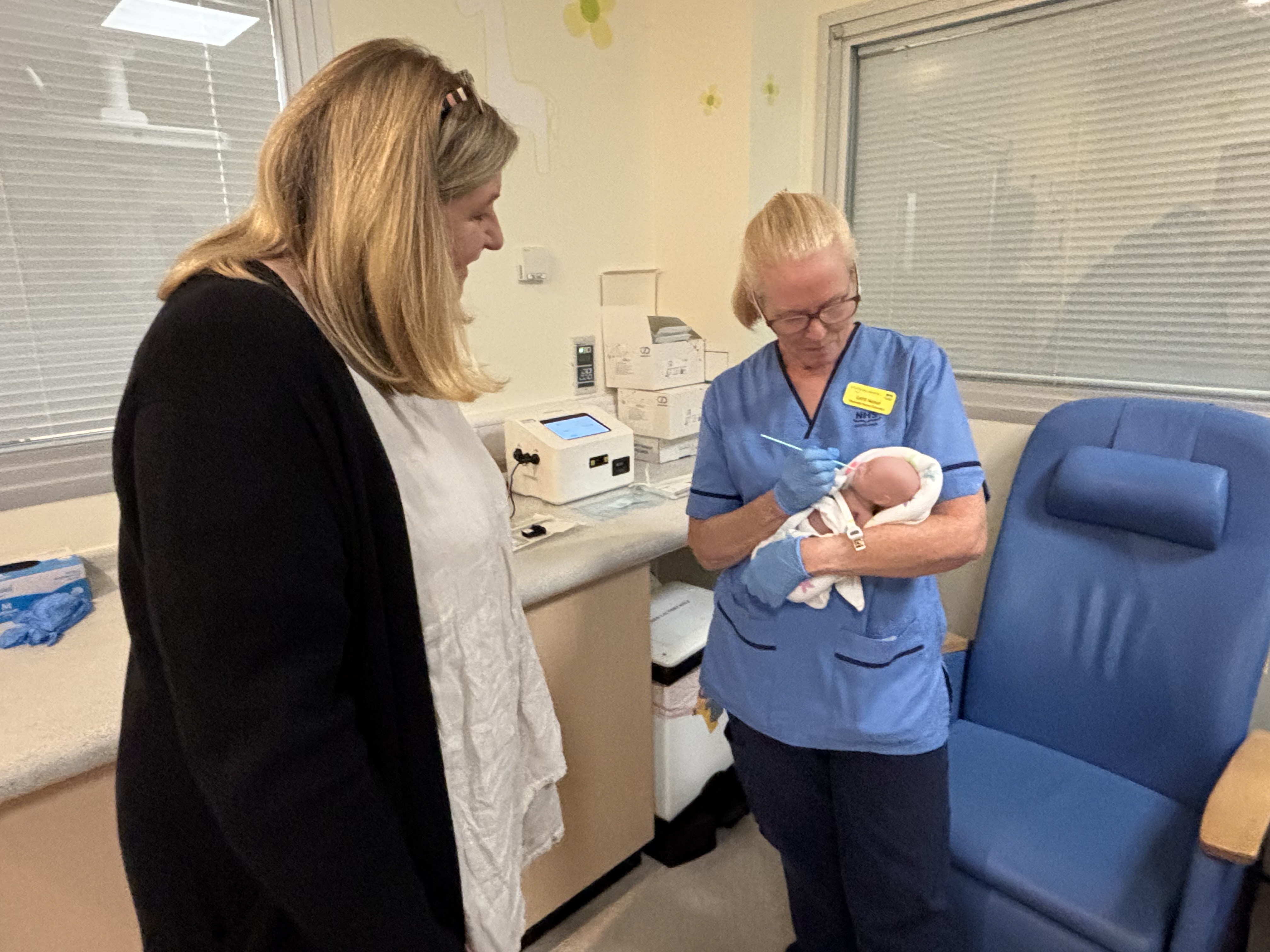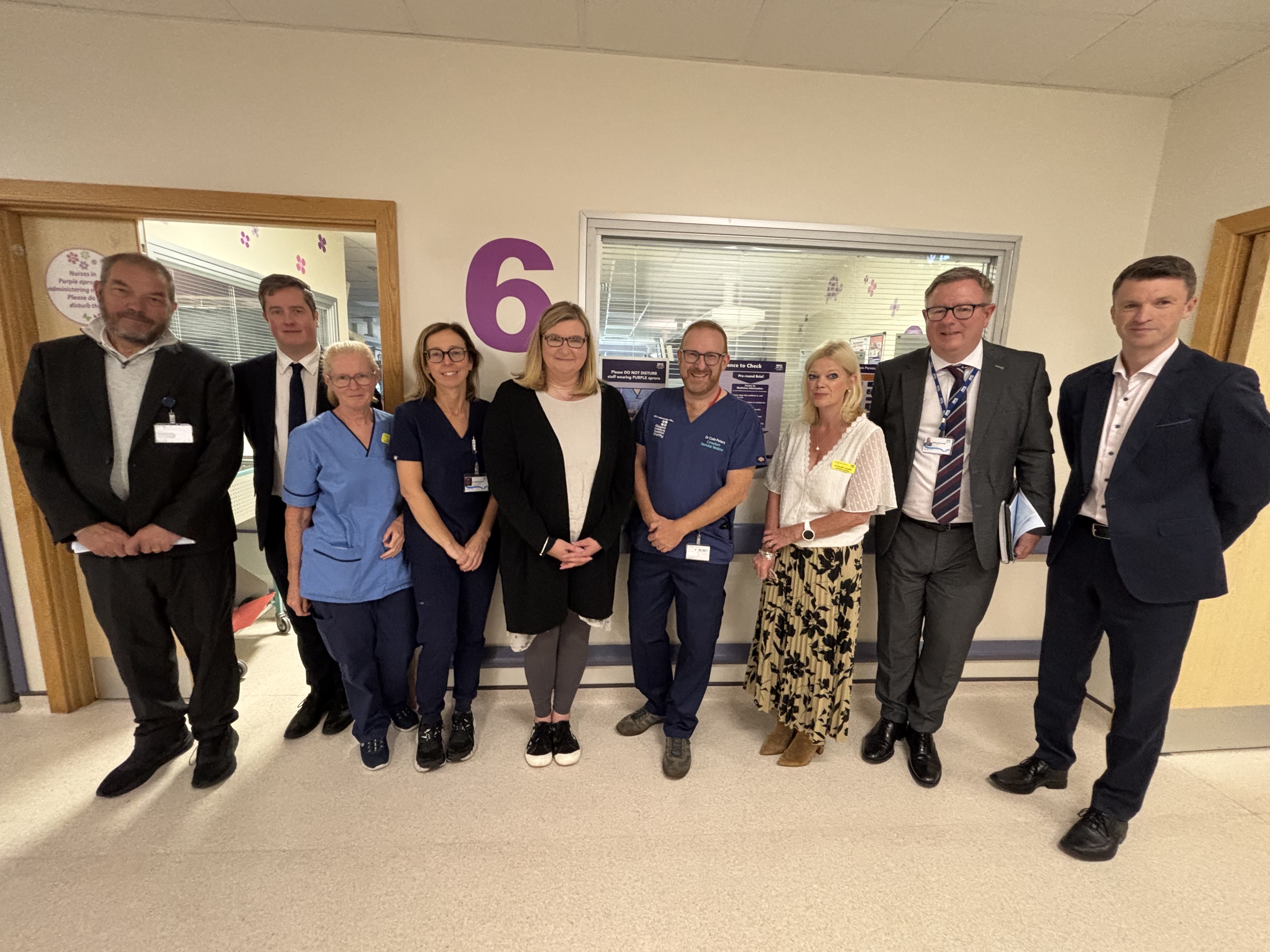Genetic test to prevent hearing loss in newborns to begin national rollout in NHS Greater Glasgow and Clyde
A groundbreaking genetic test that reduces the risk of deafness in newborn babies is being introduced by NHS Greater Glasgow and Clyde (NHSGGC) as part of a national rollout funded by the Scottish Government.
The rapid point-of-care test, which will launch in September, identifies a genetic variant that can cause permanent hearing loss when babies are treated with the common antibiotic Gentamicin.
It allows for more tailored care, with babies identified to have the variant provided with an alternative antibiotic.
The Genedrive test will start being used for babies requiring antibiotic treatment for infections within the Neonatal Intensive Care Unit at the Royal Hospital for Children (RHC) in Glasgow next month, with the Royal Alexandra Hospital and Princess Royal Maternity Hospital to follow soon after.
It will be rolled out to all territorial health boards with neonatal units over the next 18 months.
The initiative follows an assessment by the Chief Scientist Office-funded Accelerated National Innovation Adoption (ANIA) pathway, led by the Centre for Sustainable Delivery (CfSD), and a Programme for Government commitment from the Scottish Government to provide £800,000 to support national adoption.
NHSGGC, through the West of Scotland Innovation Hub (WoSIH), recommended the test for consideration by ANIA.
It follows the ongoing UK-wide PALOH (Pharmacogenetics to Avoid Loss of Hearing) programme and an assessment by the Scottish Health Technologies Group.

This week, Public Health Minister Jenni Minto visited the RHC neonatal unit to meet clinicians and representatives from the WoSIH, who have played a leading role in bringing the innovation to Scotland.
Ms Minto also discussed the planned national rollout with members of the CfSD.
Once fully implemented, it is anticipated that more than 3,000 newborn babies would be tested during the first year.
The test was developed by the company Genedrive, in collaboration with researchers from Saint Mary’s Hospital, part of Manchester University NHS Foundation Trust and The University of Manchester.
It is currently being used in 14 neonatal units across the UK, contributing to the PALOH-UK study.
NHSGGC is progressing staff training at the RHC, with the first tests scheduled for September.
Neonatal teams will be equipped to manage the testing process, adjust antibiotic treatment where necessary, and support families with confirmatory genetic testing if a positive result is found.
NHSGGC is also providing real-world data from the rollout and study to support the National Institute for Health and Care Excellence (NICE)’s evidence generation recommendations, helping to refine national guidance and inform future adoption.
The rollout reflects NHSGGC’s broader commitment to harnessing digital innovation, improving access to personalised care, and shifting the balance of care to prevent harm before it occurs through its Transforming Together programme.
Dr Helen McDevitt, Consultant Neonatologist with NHSGGC and clinical lead for the PALOH-UK study at the RHC, said: “The introduction of this point-of-care genetic testing for newborn babies requiring antibiotic treatment for bacterial infection is a landmark moment for neonatal care in Scotland.
“By introducing this test, we are taking a vital step in preventing avoidable hearing loss in newborns and ensuring safer, more personalised treatment.
“We were pleased to meet Public Health Minister Jenni Minto today to discuss the rollout of this test, which will have a hugely positive impact on the lives of many people.
“Through our adoption of this test, NHSGGC will also be able to provide real-work data to support NICE in order to help inform its national guidance.”

Public Health Minister Jenni Minto said: “I am delighted that the Scottish Government is funding the rollout of this test across all of Scotland’s neonatal units over the next 18 months.
“I want to thank the hardworking staff at the Neonatal Intensive Care Unit in Glasgow who I met yesterday and who showed me a demonstration of the genetic test for newborn babies.
"NHS reform in Scotland will be accelerated by scientific and technological innovation, and this Government is committed to supporting Scotland's excellent research base and adopting novel, evidence-proven approaches to drive further improvements for patients."
Katie Cuthbertson, National Associate Director of the Centre for Sustainable Delivery, said: “We are delighted to support the rapid adoption of this pioneering genetic test through the ANIA pathway.
“This test will help prevent avoidable hearing loss and improved outcomes for families across Scotland, and represents a major step forward in delivering safer, more personalised care for newborns.
“We are excited to continue to collaborate with Boards and clinicians across NHS Scotland, to ensure we remain at the forefront of innovative, precision medicine and sustainable healthcare transformation.”
Gino Miele, Genedrive Chief Executive Officer, said: “We are proud that NHS Scotland has sought to implement our interventional rapid genetic test nationally, ensuring over time that it is available to neonates across Scotland who might otherwise be at risk of hearing loss.
“We look forward to working closely with CfSD, ANIA and individual sites to implement this into standard clinical practice throughout Scotland.”